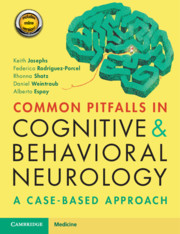Book contents
- Common Pitfalls in Cognitive and Behavioral Neurology
- Common Pitfalls in Cognitive and Behavioral Neurology
- Copyright page
- Dedication
- Contents
- Diseases Discussed in the Book
- Preface
- Acknowledgements
- Abbreviations
- Part 1 Missing the Diagnosis Altogether
- Part 2 Misidentifying the Impaired Cognitive Domain
- Part 3 Missing Important Clues in the History
- Part 4 Failure of Pattern Recognition
- Case 16 Too Many Behavioral Problems for Alzheimer Disease?
- Case 17 Look below the Surface (EEG)
- Case 18 “Too Young to Be Here”
- Case 19 Fluctuating Anxiety
- Case 20 Not Recognizing the Impostor
- Part 5 Difficult-to-Characterize Cognitive/Behavioral Disorders
- Part 6 Clinical Findings That Are Subtle
- Part 7 Misinterpreting Test Results
- Part 8 Attributing Findings to a Known or Suspected Disorder
- Part 9 Missing Radiographic Clues
- Part 10 Management Misadventures
- Index
- Plate Section (PDF Only)
- References
Case 18 - “Too Young to Be Here”
from Part 4 - Failure of Pattern Recognition
Published online by Cambridge University Press: 03 November 2020
- Common Pitfalls in Cognitive and Behavioral Neurology
- Common Pitfalls in Cognitive and Behavioral Neurology
- Copyright page
- Dedication
- Contents
- Diseases Discussed in the Book
- Preface
- Acknowledgements
- Abbreviations
- Part 1 Missing the Diagnosis Altogether
- Part 2 Misidentifying the Impaired Cognitive Domain
- Part 3 Missing Important Clues in the History
- Part 4 Failure of Pattern Recognition
- Case 16 Too Many Behavioral Problems for Alzheimer Disease?
- Case 17 Look below the Surface (EEG)
- Case 18 “Too Young to Be Here”
- Case 19 Fluctuating Anxiety
- Case 20 Not Recognizing the Impostor
- Part 5 Difficult-to-Characterize Cognitive/Behavioral Disorders
- Part 6 Clinical Findings That Are Subtle
- Part 7 Misinterpreting Test Results
- Part 8 Attributing Findings to a Known or Suspected Disorder
- Part 9 Missing Radiographic Clues
- Part 10 Management Misadventures
- Index
- Plate Section (PDF Only)
- References
Summary
This 29-year-old right-handed woman, diagnosed with schizophrenia at age 21 years, presented with a 3-year history of cognitive decline. Her earliest difficulty was focusing when studying, followed by forgetfulness, both of which affected her performance as a medical student. She ultimately dropped out from school. At the third year of symptoms, her family described her as being disorganized and impulsive. These changes were accompanied by progressive dysarthria and imbalance, with occasional falls.
- Type
- Chapter
- Information
- Common Pitfalls in Cognitive and Behavioral NeurologyA Case-Based Approach, pp. 57 - 61Publisher: Cambridge University PressPrint publication year: 2020



